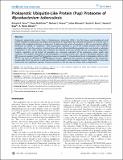| dc.contributor.author | Festa, Richard A. | |
| dc.contributor.author | McAllister, Fiona Elizabeth | |
| dc.contributor.author | Pearce, Michael J. | |
| dc.contributor.author | Mintseris, Julian | |
| dc.contributor.author | Burns, Kristin E. | |
| dc.contributor.author | Gygi, Steven P. | |
| dc.contributor.author | Darwin, K. Heran | |
| dc.date.accessioned | 2012-03-29T18:16:49Z | |
| dc.date.issued | 2010 | |
| dc.identifier.citation | Festa, Richard A., Fiona McAllister, Michael J. Pearce, Julian Mintseris, Kristin E. Burns, Steven P. Gygi, and K. Heran Darwin. 2010. Prokayrotic Ubiquitin-Like Protein (Pup) Proteome of Mycobacterium tuberculosis. PLoS ONE 5(1): e8589. | en_US |
| dc.identifier.issn | 1932-6203 | en_US |
| dc.identifier.uri | http://nrs.harvard.edu/urn-3:HUL.InstRepos:8462361 | |
| dc.description.abstract | Prokaryotic ubiquitin-like protein (Pup) in Mycobacterium tuberculosis (Mtb) is the first known post-translational small protein modifier in prokaryotes, and targets several proteins for degradation by a bacterial proteasome in a manner akin to ubiquitin (Ub) mediated proteolysis in eukaryotes. To determine the extent of pupylation in Mtb, we used tandem affinity purification to identify its “pupylome”. Mass spectrometry identified 55 out of 604 purified proteins with confirmed pupylation sites. Forty-four proteins, including those with and without identified pupylation sites, were tested as substrates of proteolysis in Mtb. Under steady state conditions, the majority of the test proteins did not accumulate in degradation mutants, suggesting not all targets of pupylation are necessarily substrates of the proteasome under steady state conditions. Four proteins implicated in Mtb pathogenesis, Icl (isocitrate lyase), Ino1 (inositol-1-phosphate synthase), MtrA (Mtb response regulator A) and PhoP (phosphate response regulator P), showed altered levels in degradation defective Mtb. Icl, Ino1 and MtrA accumulated in Mtb degradation mutants, suggesting these proteins are targeted to the proteasome. Unexpectedly, PhoP was present in wild type Mtb but undetectable in the degradation mutants. Taken together, these data demonstrate that pupylation regulates numerous proteins in Mtb and may not always lead to degradation. | en_US |
| dc.language.iso | en_US | en_US |
| dc.publisher | Public Library of Science | en_US |
| dc.relation.isversionof | doi:10.1371/journal.pone.0008589 | en_US |
| dc.relation.hasversion | http://www.ncbi.nlm.nih.gov/pmc/articles/PMC2797603/pdf/ | en_US |
| dash.license | LAA | |
| dc.subject | biochemistry | en_US |
| dc.subject | microbiology | en_US |
| dc.subject | cellular microbiology and pathogenesis | en_US |
| dc.title | Prokayrotic Ubiquitin-Like Protein (Pup) Proteome of Mycobacterium tuberculosis | en_US |
| dc.type | Journal Article | en_US |
| dc.description.version | Version of Record | en_US |
| dc.relation.journal | PLoS ONE | en_US |
| dash.depositing.author | Mintseris, Julian | |
| dc.date.available | 2012-03-29T18:16:49Z | |
| dash.affiliation.other | HMS^Cell Biology | en_US |
| dash.affiliation.other | HMS^Cell Biology | en_US |
| dc.identifier.doi | 10.1371/journal.pone.0008589 | * |
| dash.contributor.affiliated | McAllister, Fiona Elizabeth | |
| dash.contributor.affiliated | Mintseris, Julian | |
| dash.contributor.affiliated | Gygi, Steven | |


